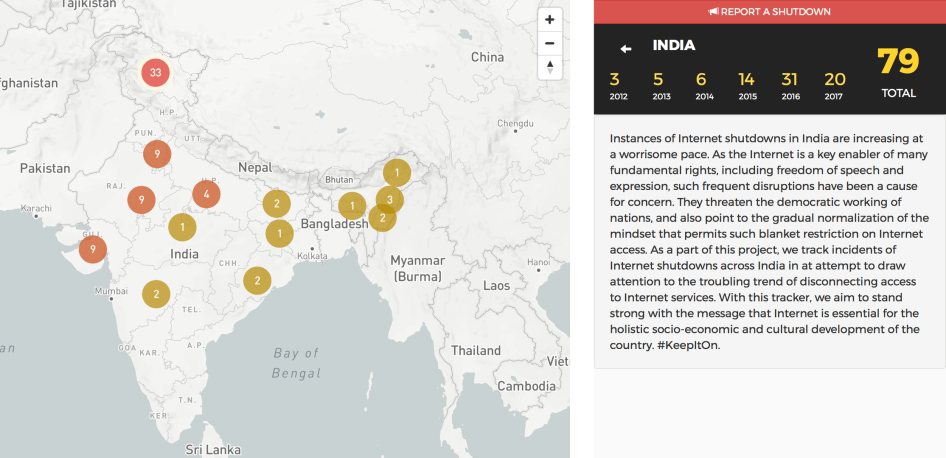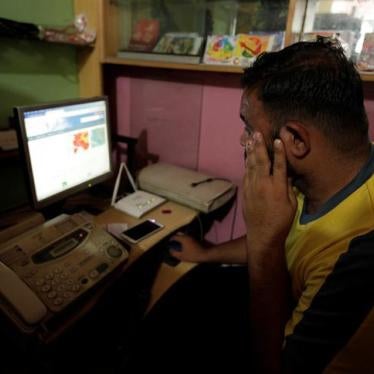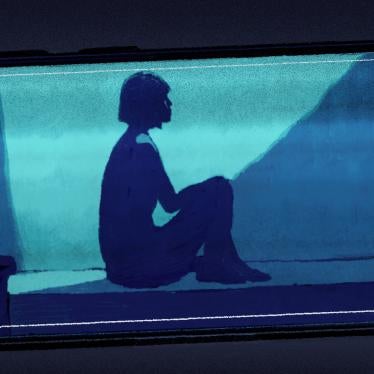(New York) – Indian authorities should cease arbitrary restrictions of the country’s internet and telecommunications networks, Human Rights Watch said today. Officials contend these shutdowns are needed to prevent violence fueled by rumors circulated on social media or mobile messaging applications.
State governments have imposed 20 internet shutdowns so far in 2017, including by four states in June. Shutdowns in response to campaigns on social media and mobile mass messaging applications spreading false and even incendiary information have frequently been disproportionate. The authorities have failed to follow legal procedures, undermined stated objectives of preventing rumors or panic, and ordered unnecessary shutdowns such as to prevent cheating in examinations.
“Indian authorities’ concerns over the misuse of the internet and social media should not be the default option to prevent social unrest,” said Meenakshi Ganguly, South Asia director. “The lack of transparency and failure to explain these shutdowns only further the perception that they are meant to suppress nonviolent reporting and criticism of the government.”
International human rights law protects the right of people to freely seek, receive, and provide information and ideas through all media, including the internet. Security-related restrictions must be law-based and a necessary and proportionate response to a specific security concern.
Recent internet shutdowns in India include:
- On June 5, the Bharatiya Janata Party (BJP)-led government in Maharashtra state suspended mobile internet services in Nashik district for a few hours after protests by farmers turned violent.
- On June 6, the BJP government in Madhya Pradesh suspended internet services in six districts following farmers’ protests for higher rates for their produce.
- On June 7, the People’s Democratic Party-led government in Jammu and Kashmir state suspended mobile internet services in the Kashmir valley after the killing of a civilian by security forces. This was the fifth time the state government had suspended the mobile internet or broadband services in 2017 in a questionable attempt to prevent rumors from fueling violent clashes between government forces and street protesters.
- On June 8, the BJP government in Uttar Pradesh state shut down internet services for two days in Saharanpur district after authorities arrested a Dalit leader following violent clashes between Dalits and members of a dominant caste. The government had also temporarily shut down mobile internet services in the district two weeks earlier.
In May, David Kaye, the United Nations special rapporteur on freedom of opinion and expression, and Michel Forst, the special rapporteur on human rights defenders, condemned the restrictions on the internet and social media services in Jammu and Kashmir, saying they had a “disproportionate impact on the fundamental rights of everyone in Kashmir,” and had the “character of collective punishment.” The statement came a month after Indian authorities temporarily blocked 22 social media sites and messaging apps, including Facebook, Twitter, and WhatsApp, as well as mobile phone data services. The government said at the time that the ban was necessary because social media services were “being misused by antinational and antisocial elements.”
Last year, the authorities in Jammu and Kashmir suspended mobile internet services in the Kashmir region from July to November. In the special rapporteurs’ May statement, Forst said such blocking “disrupts the free exchange of ideas and the ability of individuals to connect with one another and associate peacefully on matters of shared concern.”
Social media in India has at times fueled rumors leading to violence. False information has also led government officials to impose excessive restrictions. In February 2016, India’s home minister, Rajnath Singh, acting on a message posted by a fake account on Twitter, told the media that university student protests in Delhi were backed by a Pakistani militant who was allegedly behind the 2008 attacks in Mumbai. This May, a BJP member of parliament called on Twitter for author-activist Arundhati Roy to be tortured, based on a false news article that claimed she had made a statement against the Indian army. He later deleted his post.
Indian authorities have also imposed shutdowns to curtail election campaigning. For instance, authorities in Jammu and Kashmir suspended both mobile and broadband services in three districts ahead of by-elections in April 2017.
Instead of fully shutting down networks, authorities can use social media to discourage violence and restore public order. In September 2016, when riots broke out in Bengaluru city, a social media team of the police used Twitter to send out regular announcements on the law and order situation, counter rumors, and answer queries from concerned citizens.
Since 2012, 79 internet shutdowns have been reported across 14 states in India. The numbers have steadily risen, from 2 in 2012 to 31 in 2016. According to the Software Freedom Law Centre, which tracks internet shutdowns in India, a majority of the shutdowns targeted mobile internet services.
Arbitrary and overbroad internet shutdowns violate India’s obligations under international human rights law. In July 2016, the UN Human Rights Council passed a resolution condemning measures by countries to intentionally prevent or disrupt online access and information, and called for free speech protections under articles 19 of the Universal Declaration of Human Rights and the International Covenant on Civil and Political Rights (ICCPR). The council stressed the importance of combating advocacy of hatred that constitutes incitement to discrimination or violence on the internet by promoting tolerance and dialogue.
Indian law provides for online restrictions. Section 5(2) of the colonial-era Telegraph Act of 1885 allows the central or state governments to restrict or interfere with the transmission of messages, though it has not been updated to specify safeguards or procedure for internet shutdowns. Section 69A of the Information Technology (Amendment) Act of 2008 allows the government to block specific websites and pages in “the interests of the sovereignty and integrity of India, the security of the State.” The law prescribes safeguards before blocking content, but in practice the process is rarely followed. Instead, state governments use section 144 of the Code of Criminal Procedure, which gives states broad powers to prevent assemblies deemed unlawful to shut down internet services.
Internet shutdowns in India carry disproportionate costs in a digital world where increasing numbers of people access information and conduct their business online. Considering the number of essential activities and services they affect, shutdowns restrict expression and interfere with other fundamental rights, said Special Rapporteur Kaye his June report to the Human Rights Council. A report by the Washington, DC-based Brookings Institute estimated that India lost over US$968 million between July 2015 and June 2016 because of internet shutdowns.
“The Indian government has been promoting the idea of a Digital India where people increasingly access goods and services online, but which simply cannot afford blanket restrictions,” Ganguly said. “A modern India that wants technology for development cannot at the same time be haphazardly invoking national security to deny people access to essential information and services.”









